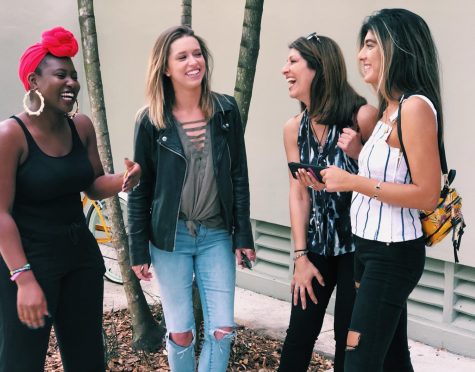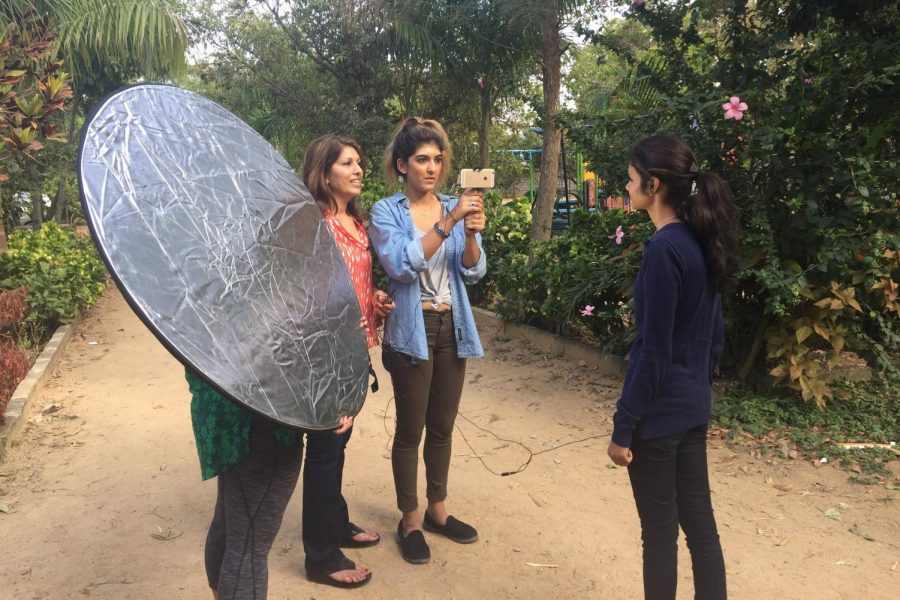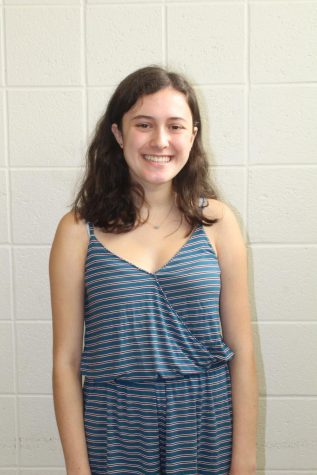Whitman alum, daughter create female empowerment platform
Photo courtesy of Monika Samtani
Monika Samtani (’85) and her daughter Natasha interview a student at Sahasra Deepika, an all-girls non-profit school in Bangalore, India. Monika said working with the school inspired her and Natasha “to tell inspiring stories of our own.”
April 28, 2019
When Monika Samtani (‘85) and her daughter Natasha Samtani think about the media platform they built to share women’s stories internationally, they come back to one word: inspiring.
“Women are the same across the world, all over the universe. We all have a story to tell,” Monika said. “The goal of our videos is that you see them, you have an intimate feeling with them and their story, and you get inspired.”
The Samtanis officially launched The Fem Word, a website dedicated to sharing influential women’s positive stories in February 2019.
Articles often feature a video of a one-on-one interview with an accomplished woman. The interviews, shot in black and white, are supposed to feel raw, intimate and focus only on the woman and her work, Monika said. The Fem Word team has produced nearly four dozen videos and now publishes one video a week.
Although the website centers on the videos, it also includes editorials written by the team members, sends a monthly newsletter and is in the process of launching a radio show.
The Samtanis and their employees have told a variety of women’s stories: they covered a sexual assault survivor who founded a follow up to the #MeToo movement called the #IHaveTheRightTo movement, and they told the story of co-founder and co-CEO of Sugarfina, a luxury candy company.
The Fem Word team includes eight high school students who mostly write editorials and original articles. The platform doesn’t have a physical office because employees are scattered throughout the U.S. and India. Instead, the media site focuses on creating a “virtual newsroom.”
Making The Fem Word a reality took years. Monika worked in broadcast TV journalism after graduating from George Washington University in 1989. Before leaving broadcast journalism, she had her own segment and was a fill-in news anchor on WUSA9, but toward the end of her broadcasting career, she noticed a disheartening trend.
“As I was growing into the industry and got married and had children, I had to take time off,” Monika said. “As I grew older, I started to see myself being overlooked. I wasn’t getting the opportunities I deserved. I just started to not feel good about going to work anymore.”
Monika went on to leave broadcast news and create her own public relations company, Ms. Media.
Before Monika started Ms. Media in the fall of 2014, Natasha studied broadcast and new media with a focus on media and entertainment at Elon University. After graduating, she helped her mom with digital projects and directed the social media strategy for her mom’s media company. Together, they worked on promotion for the premiere of “Sold,” a narrative film about sex trafficking in India for one of Ms. Media’s clients.
“That led us to realize that there’s such power in storytelling,” Natasha said. “My mom being a journalist and me having my experiences during my studies in school, we realized that there was a need to share these stories.”
Natasha was also drawn to the idea of creating The Fem Word because she spent much of her upbringing surrounded by women, she said. She graduated from Holton-Arms, an all-girls school in Bethesda, in 2010, and was involved in a sorority at Elon. When she moved to Los Angeles to work for ticketing companies in the music industry, she formed a close group of female friends.
“We’re all going through the same stuff, no matter how old you are and no matter what stage you’re at in your life. ” Natasha said. “There’s always that spark of ‘I felt that connection to you because you said something that resonated with me.’ The more people share their stories, the more likely they are to have that feeling, even if it’s virtual.”
Ms. Media’s first client was Sahasra Deepika, an all-girls school in India. Natasha and Monika created videos, reached out to press and handled social media for the non-profit school. The Samtanis also worked together on PR for “Girl Rising,” a documentary profiling individual girls in developing countries as they fight for their education.
After these three projects: “Sold,” “Girl Rising” and Sahasra Deepika, Natasha and Monika began reaching out to friends and other women they knew in L.A. and the D.C. area to tell their stories.

Monika and Natasha interview Destiny James (far left), a student at the University of Miami who received a $50,000 scholarship from Drake in his “God’s Plan” music video. Natasha, who’s an avid Drake fan, said James’ story was one of the most impactful stories they’ve told.
In the U.S., senior editor Madlyn McAuliffe edits and writes blogs and editorials for The Fem Word. Before joining the site, McAuliffe was a freelance reporter and met Monika through an article she was writing on an event for Sahasra Deepika and “Sold” hosted by Ms. Media. When the Samtanis started The Fem Word, McAuliffe wanted to join as soon as possible.
“I have never seen two women who have worked so hard—not just for themselves—but to create this platform for other women,” McAuliffe said. “There’s an altruism in that which is just so compelling, admirable and inspiring. People around the world now are becoming inspired by that as well. It’s electrifying to work with them.”
Cognizant of the ageism she faced in the broadcast news industry, Monika enlists people of all ages to write for The Fem Word, including writers as young as 14.
“As a man grows older in the media, he looks more credible,” Monika said. “My goal is that we will have women that we’re highlighting in our videos or women that are writing for us who are 13 up to 90. I don’t care as long as you have a voice and a story and it fits within our platform.”
Junior Saira Rathod began working for The Fem Word two years ago. Rathod had organized fundraisers for an all-girls school in India prior to joining the platform, and her work led to Monika inviting her to be on the staff.
“It’s amazing that I’ve been there since the beginning. Being able to watch it grow, seeing what it’s become and what it will become has been incredible,” Rathod said. “It shows so many stories and impacts so many people.”
For now, the Samtanis are looking to expand their platform, exploring possibilities to tell the stories of influential women in China and the Middle East, but moving forward, they are committed to maintaining their message.
“I don’t really care about how old you are or where you’re from or what you look like. What matters to me is that we empower each other. We’re lifting each other up,” Monika said. “We’re holding hands across the world, and we’re saying each one of us has a story and here’s where you can put it.”








